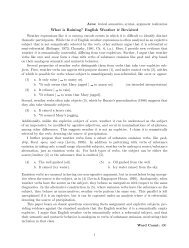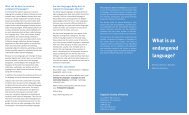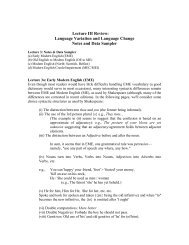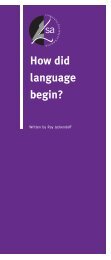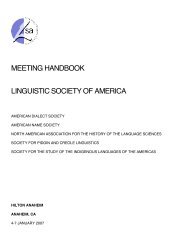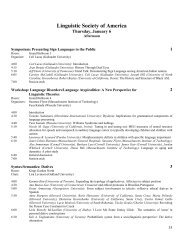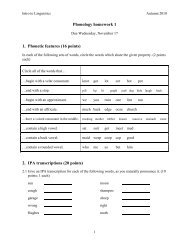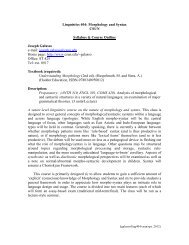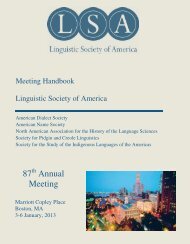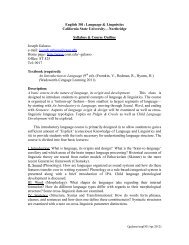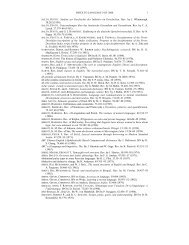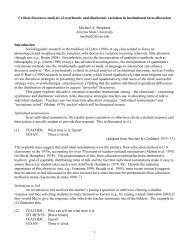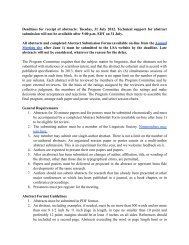here - Linguistic Society of America
here - Linguistic Society of America
here - Linguistic Society of America
Create successful ePaper yourself
Turn your PDF publications into a flip-book with our unique Google optimized e-Paper software.
Friday, 4 JanuaryWorkshoppapers, written in groups <strong>of</strong> two or three, including at least one linguistics student each, ranged from minimalist analyses <strong>of</strong> earlybilingual code switching to the extent <strong>of</strong> UG's involvement in 2nd language acquisition.Patrícia Amaral (University <strong>of</strong> North Carolina at Chapel Hill)The Hispanic <strong>Linguistic</strong>s major at UNC Chapel HillThe undergraduate major in Hispanic <strong>Linguistic</strong>s at UNC Chapel Hill started in the Fall <strong>of</strong> 2011. The number <strong>of</strong> enrollments hasshown a significant interest in this area. This presentation looks at the challenges <strong>of</strong> creating a major with a focus on linguisticswithin a department <strong>of</strong> Romance Languages. I will discuss in particular the contribution <strong>of</strong> this major to the overallreconfiguration <strong>of</strong> the department and the courses it <strong>of</strong>fers, as well as the role <strong>of</strong> the undergraduate program in laying thefoundations for a future graduate program. I will also present some <strong>of</strong> the issues addressed in course design and implementationand how the architecture <strong>of</strong> the major intends to foster interest both in <strong>Linguistic</strong>s and in the study <strong>of</strong> the other languages <strong>of</strong>feredby the department. Finally, I will talk about some <strong>of</strong> the current efforts to develop the research component <strong>of</strong> the major and itsoverall visibility within the university.Stefan Huber (University <strong>of</strong> South Florida)Teaching the terminologyOne <strong>of</strong> the major initial obstacles challenging students <strong>of</strong> foreign languages and linguistics is the acquisition and correct use <strong>of</strong>linguistic terminology. This process is by no means trivial: Learning the jargon encompasses learning the fundamental structuralcategorization <strong>of</strong> a given natural language as well as the basic concepts <strong>of</strong> linguistic research in general.This paper addresses some general issues with teaching linguistic terminology as experienced in various class settings and thesissupervisions. In particular, the possibilities and limitations <strong>of</strong> semantically-driven descriptions <strong>of</strong> grammatical phenomena (e.g.“the dative object is the receiver <strong>of</strong> a transferred object or the beneficiary <strong>of</strong> a verbal event”) and syntactic functions (e.g. “thesubject is the entity that actively carries out the verbal event”) will be discussed.For illustrative purposes, data from various native languages such as English, German, and Swedish will be produced.Christopher Sapp (University <strong>of</strong> Mississippi)The role <strong>of</strong> linguistics in a small German programThis paper discusses the place <strong>of</strong> linguistics courses in a small, undergraduate German program. Today's foreign-languageprograms are moving away from traditional content areas and are increasingly focused on pr<strong>of</strong>iciency, yet even in thisenvironment, linguistics courses have an important role to play. First, if the courses are taught in the target language andcarefully structured, students are exposed to comprehensible input and can practice speaking and writing. Secondly, students gainmeta-linguistic knowledge that they can use to refine their accuracy in producing the language. My course on German Phoneticsand Phonology introduces students to the sounds <strong>of</strong> German from a linguistic perspective, trains them in phonetic analysis, andhelps them apply that knowledge to refine their pronunciation. The final project for the course introduces students to researchingand writing a social-science paper, while encouraging them to reflect on their own acquisition <strong>of</strong> German.Thomas W. Stewart, Jr. (University <strong>of</strong> Louisville)Let descriptivism speak for itself: on laying the groundwork for more productive accounts <strong>of</strong> language phenomena inEnglish/<strong>Linguistic</strong>s cross-listed coursesIn teaching cross-listed courses on the English language, linguists <strong>of</strong>ten struggle against a tide <strong>of</strong> unconsciously-acquired (andthus unquestioningly-defended) language myths on the part <strong>of</strong> their students, which derive from standard language ideology.When a teacher chooses to foreground the catchy, time-honored, and apparently binary distinction between “descriptive” and“prescriptive” grammar, especially on day 1, what is saved in presentation time in class is lost in students’ comprehension andbuy-in. The minor formal contrast between the prefixes in these two words in fact masks a fundamental distinction in methods <strong>of</strong>argumentation and standards <strong>of</strong> evidence. A proportion <strong>of</strong> students may provisionally submit to a teacher’s “hard sell” <strong>of</strong> someversion <strong>of</strong> descriptivism out <strong>of</strong> a desire to succeed in a particular class, but because this is strategic acquiescence rather thanconviction borne <strong>of</strong> personal experience, the students’ experiment in descriptivism may well end when the course does.94



